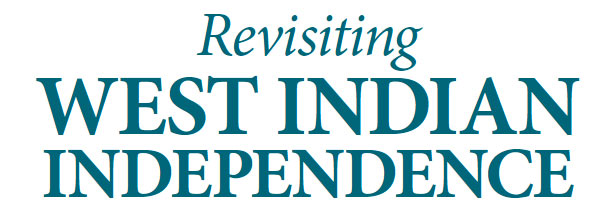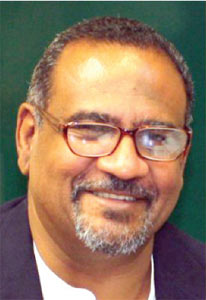
 This is an extract from a lecture delivered by Cary Fraser, Former President of the University of Belize, at the Institute of International Relations at The UWI on April 14, 2014. Please visit our website for the full lecture here. This is an extract from a lecture delivered by Cary Fraser, Former President of the University of Belize, at the Institute of International Relations at The UWI on April 14, 2014. Please visit our website for the full lecture here.
… The focus of my talk today will be the year 1962 and I will try to explore the legacies of that year for the region today as I would suggest that 1962 defined the context within which the region continues to operate in the contemporary context.
I should begin by saying that my comment about historical amnesia in the contemporary caribbean has a certain resonance with a theme of derek Walcott’s Nobel Prize Speech titled, “The Antilles: Fragments of Epic Memory” where he said: Break a vase, and the love that reassembles the fragments is stronger than that love which took its symmetry for granted when it was whole. The glue that fits the pieces is the sealing of its original shape. It is such a love that reassembles our African and Asiatic fragments, the crackedheirlooms whose restoration shows its white scars. This gathering of broken pieces is the care and pain of the Antilles, and if the pieces are disparate, ill-fitting, they contain more pain than their original sculpture, those icons and sacred vessels taken for granted in their ancestral places. Antillean art is this restoration of our shattered histories, our shards of vocabulary, our archipelago becoming a synonym for pieces broken off from the original continent.
Walcott’s graphic analysis of the challenges confronting Antillean artists is a reminder that the politics of the imagination is a domain in which the creative artists of the region have shown themselves to be very accomplished in their readings and critical analyses of caribbean reality. I would suggest that Walcott’s formulation “this restoration of our shattered histories, our shards of vocabulary, our archipelago becoming a synonym for pieces broken off from the original continent,” captures the predicament posed by political independence since the collapse of the West Indian Federation in 1962. can we as caribbean people be independent without overcoming the fragmentation and displacement that defined our condition as colonial subjects prior to 1962?
I have posed this question as a way to explore the key issues I am going to address today and I will start with the West Indian Federation which, having been established with great fanfare in 1958, collapsed in January 1962 after the Jamaican referendum of 1961 set the context and terms of Eric Williams’ equation – “one from ten leaves nought” – and unleashed the politics of fragmentation that continues to define the contemporary context. According to the summary assessment of the West Indian Federation on the cARIcOM website:
“The Federation however faced several problems. These included: the governance and administrative structures imposed by the British; disagreements among the territories over policies, particularly with respect to taxation and central planning; an unwillingness on the part of most Territorial Governments to give up power to the Federal Government; and the location of the Federal Capital.”
This summary assessment captures the central issues that shaped the failure of the Federal Project during its short life. I have explored some of these issues elsewhere but today I will offer some thoughts about the legacies of the Federation and what they say about the regional condition. First, the leaders who were part of the Federal Project could genuinely make the case for the imposition of federal governance and administrative structures. however, what explanation can we offer for the deficiencies that are embodied in current governance arrangements within the region – including the deficiencies that have hindered the development and evolution of cARIcOM?
If we take the view that we are independent, and making the relevant recommendations and/or decisions, we have to move towards implementation of agreements and changes that are required to demonstrate independence. Given the challenges of vulnerability and viability that are looming in the next several decades, particularly in the areas of climate change and food security, can we make an argument that we have developed the governance and administrative structures that will enable us to implement the policies and practices that are required to meet those challenges? In effect, the issue that has to be faced is whether we can formulate and impose upon ourselves the governance and administrative structures that will enable us to meet those challenges.
I would suggest that the current saga of the adoption of the caribbean court of Justice as the final court of Appeal in the region offers us a particular insight into the decisiveness that is absent at a broader level. More than fifty years after the onset of political independence, have we made the transition from the colonial condition that would allow us to forge the governance arrangements and administrative structures that signal the capacity to govern ourselves and ensure the survival of the territories into the future? I am suggesting that in 1962, there was the decision made to move towards territorial rather than federal independence. We need to ask ourselves now whether that strategy ofterritorial independence has worked effectively and whether territorial independence will protect us from the challenges of global problems such as climate change being addressed on the back of vulnerable states and communities – to their disadvantage.
Second, the issues of taxation and central planning to support West Indian independence. have we, either at the individual territory or regional level, found ways to forge strategies of economic integration and/or collaboration that would ensure both sustainability and survival? has there been any regional strategy developed to forge effective private sector collaboration that will make cARIcOM enterprises capable of competing at the hemispheric and global levels? With the rise of china as the workshop to the world and as a major source of global investment capital, where will the caribbean fit into a world increasingly dominated by the Asia-Pacific region? In december 1993, I was here at IIR on a panel with lloyd Best and we were talking about the changing international context after the collapse of the Berlin Wall. I raised the issue then that after the end of the cold War caribbean leaders would need to craft strategies to deal with the emergence of an international system centered within the Asia-Pacific region. Since 2008, the shift in the global axis to the Asia-Pacific region has gained increasing momentum across the entire system and the Obama Administration’s pivot towards the Pacific should be a reminder that beyond issues of security and the drug trade, the caribbean community has declined as an area of importance for many of the major states in the Atlantic world. In effect, the caribbean community member states face the continuing erosion of their claim to independence and sovereignty – a development that first emerged as a serious threat in the wake of the oil crises of the 1970s and the onset of the debt crisis of the 1980s. Effective fiscal management as a platform for achieving and maintaining independence has been a central problem for the region – as was evident in the failure of the federal project. has the situation changed significantly since 1962 with the onset of territorial independence? |





